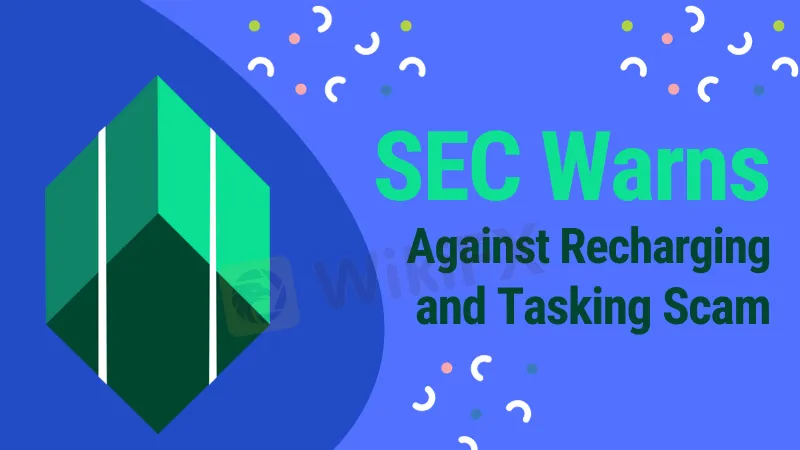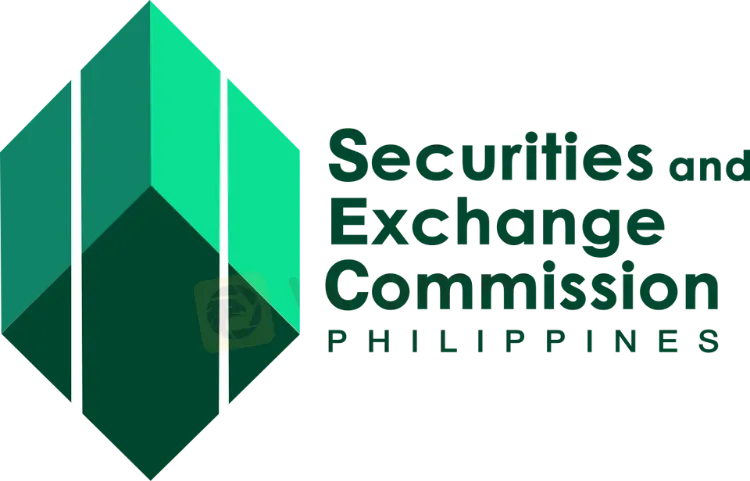简体中文
繁體中文
English
Pусский
日本語
ภาษาไทย
Tiếng Việt
Bahasa Indonesia
Español
हिन्दी
Filippiiniläinen
Français
Deutsch
Português
Türkçe
한국어
العربية
SEC Warns Against Recharging and Tasking Scam
Abstract:SEC warns of Recharging and Tasking Scam: Protect yourself from online frauds. Stay vigilant and report suspicious activities to SEC for assistance.

To safeguard the public from deceptive schemes, the Securities and Exchange Commission (SEC) is alerting individuals to be cautious of the growing threat known as the “Recharging and Tasking Scam.” As technology advances, scammers are finding new ways to defraud people through fake e-commerce platforms, pretending to be trustworthy companies such as Amazon, Shopee, Lazada, and eBay.
What is a Recharging and Tasking Scam?

Recharging and Tasking Scams involve fraudsters enticing people online, claiming to offer online jobs through counterfeit e-commerce platforms.
How does it happen?
Scammers ask individuals to invest money in these schemes, promising commissions and rewards. The scammers often pretend to be affiliated with well-known companies like Amazon, Shopee, Lazada, eBay, and other e-commerce platforms. They urge potential investors to register and enroll on their platforms, where investors can select packages, levels, or VIP levels ranging from ₱100 to ₱50,000 and make payments or deposits (“recharge”). Investors are told they can earn commissions between 2% and 8%, along with invitation rewards ranging from ₱10,000 to ₱100,000, depending on the number of individuals they successfully invite or enroll.
However, it's a dishonest setup, similar to a Ponzi scheme, where new investors' money is used to pay fake profits to earlier investors.
Red Flags to Watch Out For
1. Unrealistic Promises: Be cautious if the scheme promises unusually high returns and significant invitation rewards.
2. Fake Job Offer: These scams often pose as online job opportunities. Verify the legitimacy of the job and the platform offering it, especially if they claim to be connected to well-known companies.
3. Investment Requirement: If the scheme demands upfront money, especially through payments or deposits, be skeptical. Legitimate job opportunities usually don't require upfront payments.
4. Ponzi Scheme Structure: Ponzi schemes are unsustainable and eventually collapse.
5. No Registration or License: Legitimate investments are typically registered with relevant authorities.
6. Pressure to Recruit: Scammers may push individuals to recruit others to join the scheme, focusing on rewards for bringing in new investors.
7. Lack of Transparency: If the investment process, company background, or scheme organizers' details are unclear or undisclosed, exercise caution. 8. Legitimate opportunities provide transparency in these aspects.
SEC Reminder
The SEC strongly advises the public against investing in or continuing to invest in such scams, as they are fraudulent and unsustainable. The Commission emphasized that selling securities through fraudulent and unsustainable Ponzi schemes is not allowed, and the SEC will not issue licenses for such activities.

Individuals acting as salesmen, brokers, or agents for these scams may face criminal liability, including fines or imprisonment. The authorities will report all involved individuals to the Bureau of Internal Revenue (BIR) for appropriate penalties and taxes.
First Warning for a Recharging and Tasking Scam
In a January 8 advisory, the SEC alerted the public to GOSHOP PH, an entity promoting an online platform offering online jobs with promises of high commissions for completing tasks. The Commission stressed that the platform, operating at https://goshopph.net/, uses a counterfeit certificate of incorporation to appear legitimate. The advisory identifies this scheme as involving the sale of securities through “investment contracts,” necessitating proper registration with the SEC.
Stay vigilant and protect yourself from Recharging and Tasking Scams. If you encounter suspicious activities or have concerns, contact the SEC for guidance and assistance.

Disclaimer:
The views in this article only represent the author's personal views, and do not constitute investment advice on this platform. This platform does not guarantee the accuracy, completeness and timeliness of the information in the article, and will not be liable for any loss caused by the use of or reliance on the information in the article.
Read more

Why More People Are Trading Online Today?
Discover why online trading is booming with tech, AI, and a push for financial freedom. From stocks to crypto, it’s a thrilling hustle for all.

SEC Ends Crypto.com Probe, No Action Taken by Regulator
The SEC has closed its investigation into Crypto.com with no action taken. Crypto.com celebrates regulatory clarity and renewed momentum for the crypto industry.

Bitpanda Secures Full Broker-Dealer License in Dubai
Bitpanda has officially obtained a full broker-dealer license from the Dubai Virtual Assets Regulatory Authority (VARA), marking a significant milestone in its international expansion. This approval, which follows preliminary authorization granted three months earlier, enables the European digital asset exchange to introduce its comprehensive suite of virtual asset services to investors in the United Arab Emirates (UAE).

Interactive Brokers Expands Crypto Trading with Solana, XRP, Cardano, and Dogecoin
Interactive Brokers adds Solana, XRP, Cardano, and Dogecoin to its platform, enabling U.S. and U.K. clients to trade crypto 24/7 with low fees.
WikiFX Broker
Latest News
Why Are Financial Firms Adopting Stablecoins to Enhance Services and Stability?
Experienced Forex Traders Usually Do This Before Making a Lot of Money
Octa vs XM:Face-Off: A Detailed Comparison
When High Returns Go Wrong: How a Finance Manager Lost RM364,000
Bridging Trust, Exploring Best—WikiEXPO Hong Kong 2025 Wraps Up Spectacularly
Fidelity Investments Explores Stablecoin Innovation in Digital Assets Sector
Interactive Brokers Expands Crypto Trading with Solana, XRP, Cardano, and Dogecoin
SEC Ends Crypto.com Probe, No Action Taken by Regulator
Why More People Are Trading Online Today?
Gold Surges to New Highs – Is It Time to Buy?
Currency Calculator







